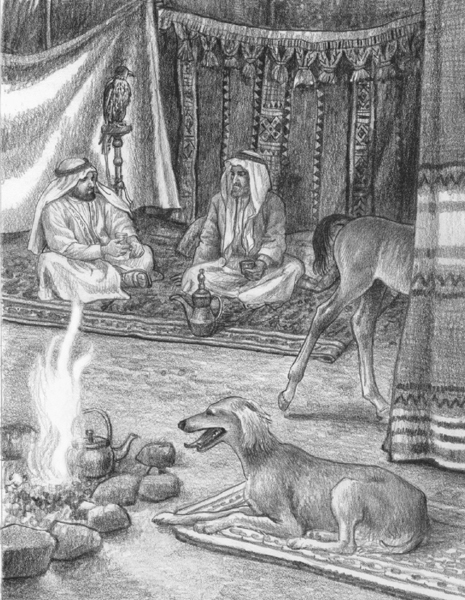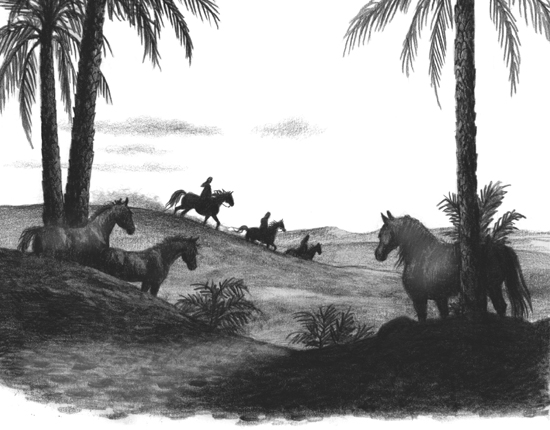

“Safiya!” one of the men called out with relief as the girl and I burst into the tent, bringing a whoosh of wind and a cloud of dust from the sandstorm along with us. “When the storm blew in with the speed of a gazelle, we feared you were lost in it!”
“I’m all right.” The young girl was panting with the exertion of fighting the wind. “But Yatimah is hurt. She spooked just as we got back and cut her leg on a rock.”
I had never been inside the humans’ tent before, though Jumanah had told me about it. It was a big, shadowy place lined with rugs and cushions and smelling strongly of the dark heated liquid the humans often drank. A falcon was perched upon a stick with a hood over its head; it turned its face toward us even though there was no way it could see us. Several dogs lounged near a small fire nearby. Nasr was sitting there as well, along with the other men of our camp. He looked up sharply at hearing my name, then frowned and turned away. But he said nothing as Safiya hurried me past and through a flap into another section of the tent.

“Don’t pay any attention to Father,” she whispered to me. “I know he shows little care for you now. But it is only because he misses your mother so much. He’ll come around after a while.…”
I hardly heard her. It was very strange being trapped within the woven walls, with more fabric blocking out all view of the sky overhead. Even the sounds of the storm were muffled in here. For a moment, I felt the urge to run, to fight my way back out into the openness of the oasis.
But then I felt Safiya’s gentle hands upon me, and my mind cleared. I was with friends here. The humans had always taken care of me; they would allow no harm to come to me now.
I found myself in another large room. This one was occupied by women and the younger children. The scents of human food hung in the air along with smoke from the fire. Soon I was surrounded by caring faces.
“What have we here?” one of the women asked. “Ah, Yatimah, I see your liveliness has gotten you into some trouble. Never mind, it’s nothing serious. We’ll just clean the wound and you’ll be good as new in a week or so.…”
There was more, but the words mattered little to me. My eyes and ears drooped with relaxation as the human voices washed over me, soothing and familiar. I hardly even felt the sting as Safiya gently scrubbed out my wound and applied some sort of salve to it. Before long the pain and throbbing had faded enough for me to collapse onto the ground and drift off to sleep.
The next morning, Safiya led me out of the tent through the men’s room. Nasr looked up from his breakfast as we passed.
“That filly going to be all right?” he asked gruffly.
“Yes, Father.” Safiya smiled at him hopefully. “Yatimah is a strong foal. Just like Sarab was. I know she’s going to make just as fine a war mare one day.”
“We’ll see.” The man ran his eyes over me. “Sarab once carried me through a terrible sandstorm for nearly an hour without ever hesitating or taking a wrong step. Or spooking at a rock, of all things.”
I was feeling impatient to get back outside. Wriggling beneath Safiya’s hands, I lunged toward the tent opening, my nostrils seeking the fresh air and my stomach crying out for Jumanah’s milk.
“Wait, little one,” Safiya told me, trying to hang on to my short mane.
“Skittish, is she?” Nasr’s frown deepened. “Not like her dam in that way, either.”
“She’s not skittish,” Safiya said. “Just full of energy, that’s all.”
Nasr stood and followed us out of the tent. I let out a whinny as I spotted the other horses drinking at the edge of the spring. Tawil heard me, his head shooting up as he returned my call.
“Too bad the only other foal we got this year was that colt,” Nasr said. “Still, I suppose I can make do with Zahrat for a while. Or perhaps I can get Jumanah back into shape once the foals are weaned.…”
I heard no more as I raced off to join the herd. Later, though, I remembered the sad look on Safiya’s face at her father’s words.
Why does Nasr always frown when he looks at me? I asked that evening after Tawil and I had eaten some dates and then drunk our fill of Jumanah’s milk.
Jumanah blew a long sigh out of her large nostrils. The ways of humans are a mystery, she said. But I do know that Sarab was very special to Nasr. She was his favorite war mare.
Are you a war mare, Mama? Tawil asked.
I was the war mare of Nasr’s son Basim before I became too heavy with foal, Jumanah replied. Now Basim rides Gameela, so I suppose I am just a mare again.
But what does a war mare do that just a mare doesn’t? I asked.
The men ride the war mares when they raid other men’s camps, Jumanah said.
Raid? Tawil echoed. What does that mean?
The sound of Nasr’s voice interrupted our discussion. He appeared with two of his sons at his side, all of them talking in loud, excited voices.
What’s going on? I asked.
Hush, little ones, Jumanah responded. Just stay out of their way and you shall see all in time.
I watched as Nasr saddled and mounted Zahrat, while his sons prepared their own mares, Gameela and Ibtisam. Tawil looked as perplexed as I.

Where are they going? he asked as horses and riders disappeared into the darkening desert.
Do not worry, Jumanah told us. They will return soon enough. Then you will understand what I mean by a raid.
She refused to say any more. Several hours passed, enough for me to forget about the mystery of the humans’ behavior and drift off to sleep, even though it felt strange to have part of our herd missing.
I was startled awake by shouts and the thunder of hooves. Scrambling to my feet, I saw men and horses galloping into the oasis. Basim and his brother were laughing and shouting, though Nasr was quiet. All three mares looked weary, but they started prancing with excitement when they saw us watching. There was a bleating lamb slung across the front of Zahrat’s saddle, while Ibtisam was carrying two young goats.
Then my eyes widened as I saw that these were not the only strange new creatures with them. Gameela’s rider was leading an unfamiliar mare beside her!